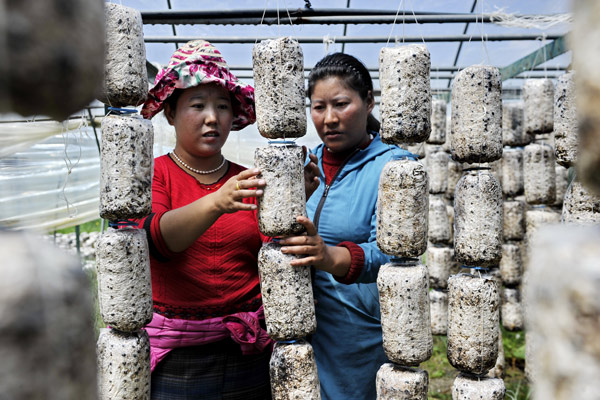Bringing new hope to poorest people on plateau
China Daily, November 29, 2016 Adjust font size:

Phurbu Chozin (left), founder of an agricultural cooperative in Nyingchi, teaches a villager how to grow mushrooms. [Photo by Zhang Rufeng/Xinhua]
Meanwhile, in Sonam Tenzin's village, the local authorities have helped 11 poverty-stricken households to establish a cooperative to raise pigs.
He said he could have made a much larger income if he had migrated to an urban area in search of employment opportunities. "But I have people to take care of. What if they got sick while I was absent?" he said.
Instead, he has been offered a job as a forest ranger, which will guarantee an annual income of about 3,000 yuan. He also has an occasional part-time job as a taxi driver for tourists bound for the Yarlung Zangbo River.
However, Sonam Tenzin said he still fears the worse-case scenario: That a relative will be hit by a serious illness and the medical bills will be beyond his means.
"I don't think anyone would lend me any money. It would be natural for them to doubt my ability to repay them," he said.
Challenges and concerns
The real challenge for the authorities in their poverty-alleviation efforts lies in working out how poor households can be helped to make a living without government assistance.
Nyima, the official, voiced concerns about the potential side effects of providing poverty-stricken families with free resettlement.
"The government definitely has good intentions. Despite that, people who have managed to break out of poverty through their own efforts might think that some others did nothing but still managed to move into spacious new homes and will simply accept another subsidy at the end of the year," he said.
"Some people just do nothing and think the government will take care of them, anyway," he added. "Stopping the resettlement projects from turning into slums is at the top of our agenda."
In one resettlement project in an urban area of Nyingchi, the authorities have set an entry condition that requires poor households to have at least one person working in the area before they are allowed to move in. Migrants are also allowed to keep the farmland they have left behind.
Despite his excellent academic performance, the need to support his family forced Sonam Tenzin to drop out before he finished high school. Now, his dearest wish is that his children will receive an education good enough to help them live up to their potential.
"Every time I am invited to a gathering of my junior high school classmates, I always refuse. We were very close, but now we live very different lives," he said.
"I just hope my children will not be in the same position as me in the future."